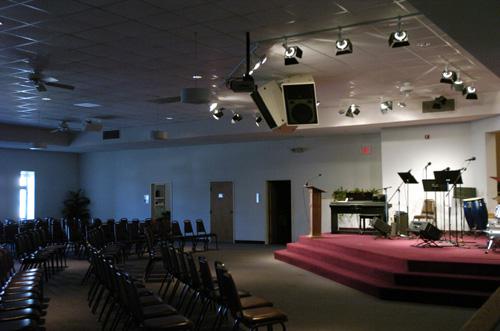Churches take week of prayer for AIDS healing and awareness

New Covenant Fellowship, located at 124 West White St. in Champaign, is among the churches participating in Black Church Week of Prayer for the healing of AIDS. Katie Lafferty
Mar 14, 2008
Last updated on May 12, 2016 at 11:03 p.m.
Local African-American churches took part in a nationwide week of prayer for the healing of AIDS last week. The event took place with the help of the Champaign-Urbana Public Health District, which provided free educational resources to support the cause.
“Statistically, African-Americans are being more exposed to HIV,” said Janice Walker, Public Health District prevention specialist. “The numbers are still increasing so it’s something we needed to focus on.”
The Public Health District offered information as well as HIV screenings to those who participated. Illinois has the seventh highest number of AIDS cases in the nation with 30,000 cases reported since the disease was discovered in 1981, according to the Illinois Department of Public Health. Nationally, the African-American rate of AIDS infection is five times higher than that for Caucasians.
Those statistics prompted Pernessa Seele, founder and CEO of the Balm in Gilead, an African-American religious organization, to promote a nationwide week of prayer to combat the disease.
Get The Daily Illini in your inbox!
“Nineteen years ago I got the idea because I was just overwhelmed with how many people were dying in hospitals in Harlem (New York), and nobody was giving them any support,” she said. “The week of prayer is really a mobilization of African-American churches to pray and educate.”
This year’s events marked the 16th consecutive year the event has taken place. In Champaign, Glory International Center and New Covenant Fellowship participated in the prayer and educational efforts. Churches in Danville and Rantoul took part as well.
The week’s events aimed at encouraging community members to test themselves for the HIV virus and rethink the AIDS stigma that has traditionally existed in the African-American community, Seele said.
Seele credits the support received from health departments, including the Public Health District, for helping to create a 300 percent increase in HIV testing among African-American churchgoers last year.
“People need to remember that they need to get tested,” said Joe Trotter, Public Health District prevention specialist. “HIV is still here even though it’s not being talked about as readily in the media as it used to be. It’s still alive and strong.”
Having seen her dream grow into a national event, Seele said that African-American churches must continue combating HIV and the AIDS virus it causes.
“The black church is the one institution that changes the way people think and act in our community,” she said. “We cannot stop until we have every church in the nation providing HIV information every Sunday.”





